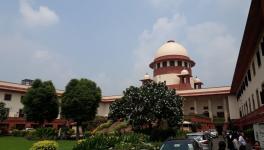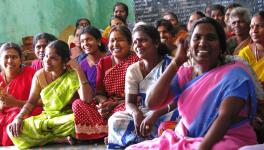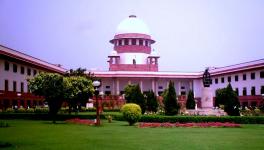Countering Patriarchy, One Feminist Judgement at a Time

“How does the judiciary’s conception of the nation state and the military’s might, which runs counter to the feminist concepts of nationhood and militarisation, work to deny compensation and justice to a widow whose husband was killed in a clear case of custodial torture? How could the Supreme Court ruling and the Armed Forces Tribunal’s decision to refuse accountability for the perpetrators be relooked at, and rewritten, from a feminist perspective?” asked Vrinda Grover, noted human rights lawyer. “At the end of the day, it isn’t about how many women are on the bench, but about what perspectives and ideologies they bring to their decision-making processes. Also, the very concept of the closed-door court martial proceedings, which turn the principles of open justice on its head, is antithetical to the feminist ethos,” Grover continued.
Grover was speaking at a session in the two-day workshop titled “Righting Together” organised by the Indian Feminist Judgements Writing Project, which got over in Delhi recently, and included a roundtable on feminist lawyering and feminist judging.
The case which Grover was discussing was that of Masooda Parveen. On May 2, 2007, a two-judge bench of the Supreme Court comprising Justices B.P. Singh and Harjinder Singh Bedi dismissed the writ petition filed by a widow Masooda Parveen of Kashmir’s Chandhara Pampore. In 1998, Masooda’s husband lawyer Ghulam Mohi-ud-din Rigoo was taken away by personnel of the Indian Army’s 17 Jat Regiment on suspicion of being a militant (though nothing incriminating was found in the raid on his house), and three days later, his mutilated corpse was returned to his family. His corpse showed tell-tale signs of torture, but the army claimed that he was killed by a booby-trap while he was leading the soldiers to a site where militants had hidden a cache of explosives.
After nearly a decade, the apex court turned down Masooda’s plea for compensation, citing – among other things such as protection of the military’s morale in fighting terrorism – that “prompt action by the army in such matters is the key to success”. In 2012, the Armed Forces Tribunal refused to prosecute Major D.S. Punia, who had led the operation in course of which Masooda’s husband was allegedly murdered.
Grover questioned, “Would a feminist judge have held that the Indian state’s fight is also the judiciary’s fight? Would a feminist judge have placed the entire burden of proof on the petitioners, given the peculiar nature of the custodial death case it was dealing with? Is it only because the alleged crime was committed in Kashmir?”
Expanding boundaries
There is an oft-repeated misconception: “feminist” perspective can be brought only into cases of matrimonial rights or sexual violence. This misconception has to be uprooted, said Jhuma Sen, who teaches at JindaL Global Law School, and is one of the conveners of the project. Hence, she and her team of academicians, lawyers and retired judges decided to look at a gamut of cases, ranging from fields as diverse as death penalty jurisprudence to contract law, tort law, and even the intellectual property law. A total of 40 judgements were critically analysed and discussed, and the rewritten versions are expected to be published in a volume by January 2019.
For instance, senior advocate and noted criminal lawyer Rebecca John scrutinised the Supreme Court’s 2002 decision in the Devender Pal Singh Bhullar case, in which a man was convicted under the dreaded Terrorist and Disruptive Activities (Prevention) Act – also known as the infamous anti-terror law TADA. John, along with former Public Prosecutor Anita Abraham, questioned the majority’s decision to award the death penalty in a case where it was evident that there were glaring discrepancies in the way the custodial confession of the accused (the only thing the judges relied upon) was regarded by the judiciary. They even critiqued the way Section 15 of TADA was drafted, giving unlimited power to the state to ensnare dissenters and innocents with its jaws. The minority judgement by Justice M.B. Shah should provide a considerable amount of light to those who seek to rewrite the judgement from a feminist perspective.
Then there was this April 17, 2017 decision of the assistant controller of patents and designs, in which it was held that an innocuous sex-toy – a vibrator – should not be granted a patent on the grounds of obscenity and offending public morality. Swaraj Pal Barooah of the Bangalore-based research and advocacy organisation Centre for Internet and Society questioned, “On what basis did the deciding authority hold that an item which enhances sexual pleasure among couples, especially among women, could be deemed as obscene?” He referred to a critique of the decision written by Prof. Shamnad Basheer and Pankhuri Agarwal, and wondered: would a feminist judge have decided in the same way, guided by comstockery?
Appellations not important, perspectives are crucial
Speaking at the roundtable, Justice D.Y. Chandrachud of the Supreme Court, who is being hailed for his decisions in the Sabarimala temple entry, the Aadhaar case and the decriminalisation of adultery case said, “I do not want to go by appellations of being a feminist (or otherwise) and decide cases according to the constitution and what my conscience dictates. Some judges are more liberal, others are not. But, what is critical is if, as a judge, you are giving effect to the constitutional values of equality, liberty and fraternity. The Constitution requires you to give effect to the fundamental essence of equality; the equality which is the substance of the Constitution. When you apply feminist principles in deciding, you are only giving effect to this substantive equality of the constitution,” he said.
“What does feminism add to the process of adjudication? Does it contribute to the improvement of the jurisprudence?” asked John. To her question, Justice Chandrachud replied, “Judges may decide contrary to popular antagonistic social beliefs. Like my adultery judgment is being criticised for promoting licentious behaviour. What we learn of the law and how we apply it is based on the judges’ knowledge of the world, which is a man’s world, and that is why a feminist outlook assumes significance.” He also said that a judge with a feminist perspective would have strongly opposed the Supreme Court’s Justice Markandey Katju’s decision allowing the screening of a video showing Aruna Shanbaug’s pitiable plight in Bombay’s KEM hospital, where she, victim of a rape attempt, lay in a permanent vegetative state for more than four decades, for that would have trampled upon her right to privacy.
Justice Prabha Sridevan, retired judge of the Madras High Court and someone widely acclaimed for her rulings which bent the arc of history towards justice, said that feminist judges must disturb and disrupt the status quo, and laws which challenge the status quo – such as Section 498A of the Indian Penal Code, or the SC & ST (Prevention of Atrocities Act) which challenge the dominant positions of society – would always be subject to trenchant criticism, but that hurdle has to be overcome.
At the plenary session which marked the end of the workshop, Justice Sridevan said that it is incumbent upon the judgement rewriting project to take due care of temporal limitations of the judgements it is reviewing, but the rewriters must not be bound by the effects of time- they should feel free to factor in many changes in the law, progressive changes, of course, which have been incorporated since the original judgements were developed. After all, the rewriters would have to perform the roles of “missing judges”, which would not have been essential if feminist judging and lawyering were the norm, rather than the exception.
Saurav is an independent journalist based out of Delhi, and specialising in reporting on legal, human rights and gender issues. He earlier used to teach media law and jurisprudence in Bombay and Pune. He tweets @SauravDatta29
Get the latest reports & analysis with people's perspective on Protests, movements & deep analytical videos, discussions of the current affairs in your Telegram app. Subscribe to NewsClick's Telegram channel & get Real-Time updates on stories, as they get published on our website.






















